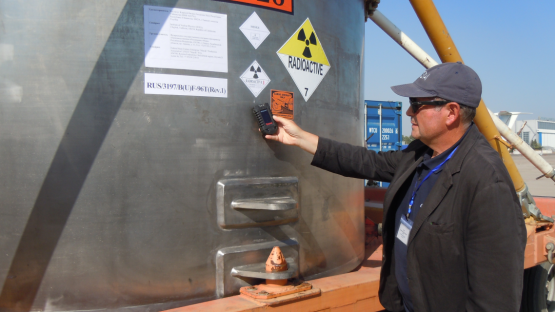Following the entry into force of the Amendment to the Convention on the Physical Protection of Nuclear Material (CPPNM) today, the international community must focus on its implementation, said IAEA Director General Yukiya Amano. Mr Amano also called for speedy adherence by the remaining 50 State Parties to the old Convention to strengthen nuclear security and reduce the threat of nuclear terrorism worldwide.
“The entry into force of the Amendment demonstrates the determination of the international community to act together to strengthen nuclear security globally,” said Mr Amano at an event marking the entry into force of the Amendment. “The Agency has worked hard, in particular in the last few years, to encourage countries to adhere to the Amendment. … Our collective efforts have now paid off. The world will be a safer place as a result.”
The Amendment expands the original Convention, adopted in 1979, to cover the protection of nuclear facilities and nuclear material in domestic use, storage and transport. In addition, it expands the existing offences identified in the CPPNM, such as the theft of nuclear material, and introduces new ones, in particular the smuggling of nuclear material and the actual or threatened sabotage of nuclear facilities. Further, the Amendment provides for expanded cooperation and information sharing between States to locate and recover stolen material and in the case of sabotage.
The adherence of two-thirds of the States Parties to the CPPNM was required for entry into force of the Amendment. This threshold was reached on 8 April. See related article.
Facing up to new challenges
“Nigeria is particularly greatly pleased that the [entry into force of the Amendment] is coming at a time when the world is faced with new and emerging threats of nuclear materials falling into the hands of non-state actors,” said Adelakun Abel Ayoko, Nigeria’s Permanent Representative to Austria and the IAEA. “The weak link in nuclear security has now been finally strengthened.”
Nigeria played an important role in the promotion of the entry into force of the Amendment in Africa by hosting a regional workshop on the Amendment in 2012.
The IAEA will continue to provide legislative and technical assistance to Member States to facilitate the implementation of the Amendment. “Working closely with national experts and key international partners, the Agency will continue to deliver tangible improvements in nuclear security in the years ahead,” Mr Amano said.
Many countries are already in the process of implementing some of the additional requirements in the Amendment.
“Spain has experienced remarkable progress in terms of the integration of the stipulations of the Convention into its national legal system,” said Gonzalo de Salazar, Spain’s Ambassador to the IAEA. Since its acceptance of the Amendment in 2007, Spain has updated its regulations for the physical protection of nuclear material and facilities in 2011 and 2015. At the same time, Spain has carried out intense diplomatic efforts to promote the entry into force of the Amendment, in particular with Latin American countries.
International cooperation
While some countries have already made domestic legislative changes, the new international notification and cooperation requirements will only fully become operational now that the Amendment has entered into force. To facilitate their implementation, the IAEA will hold a Meeting of Points of Contact and Central and Competent Authorities of States Parties to the CPPNM and the CPPNM Amendment before the IAEA International Conference on Nuclear Security on 5-9 December, Mr Amano announced on Friday.
Through this meeting the IAEA will seek to facilitate the early and effective implementation of the Amendment and the practicalities of international cooperation. Another objective of this first meeting will be to clarify roles and responsibilities of the Points of Contact within the scope of the Amendment.
Several countries have assisted others in the preparation for the implementation of the Amendment. “ Since October 2011, Canada’s Global Partnership Program has provided $720,000 towards six regional workshops and provided follow-up assistance for the purpose of assisting other countries with the implementation of the Amendment,” said Ché van Haastrecht, Chargé d’affaires at the Permanent Mission of Canada to the International Organisations in Vienna. “Canada welcomes working with the IAEA to help other countries in implementing the Amendment in light of the entry into force.”
There are still 50 Parties to the CPPNM who have not adhered to the Amendment and Mr Amano urged them to do so as soon as possible. “Universal implementation of the amended Convention will help to ensure that nuclear material throughout the world is properly protected against malicious acts by terrorists.”
The weak link in nuclear security has now been finally strengthened.





